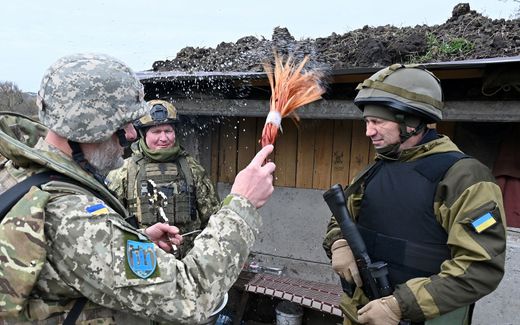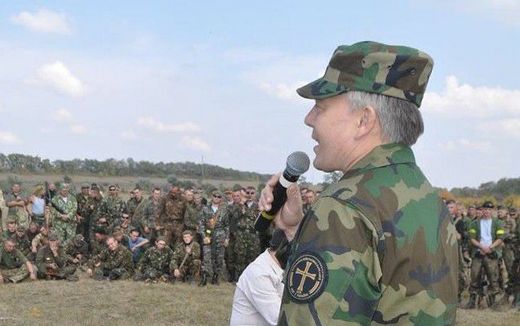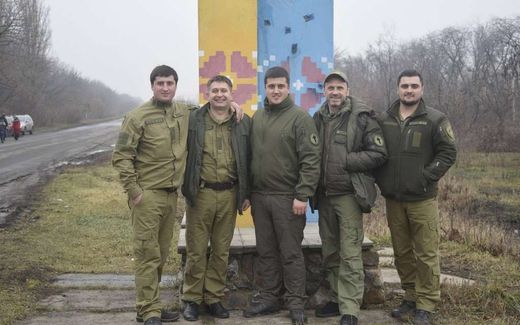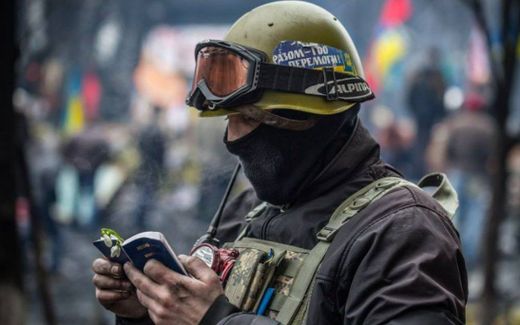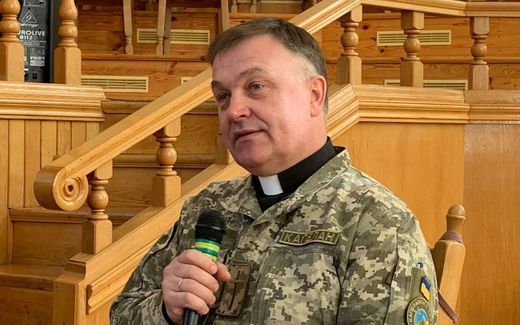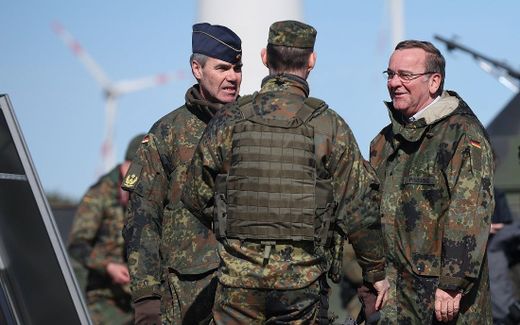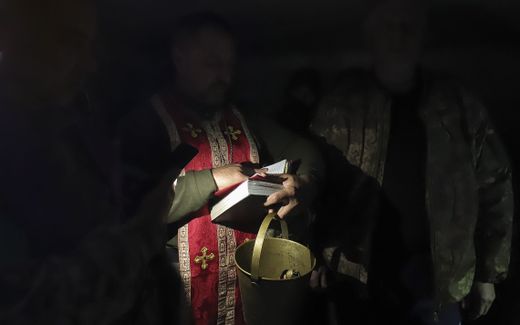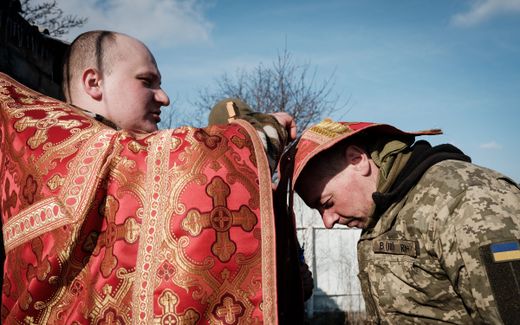Chaplain bakes pizza amid horrors of Ukraine's frontline
24-01-2024
Eastern Europe
Gerard ten Voorde, RD
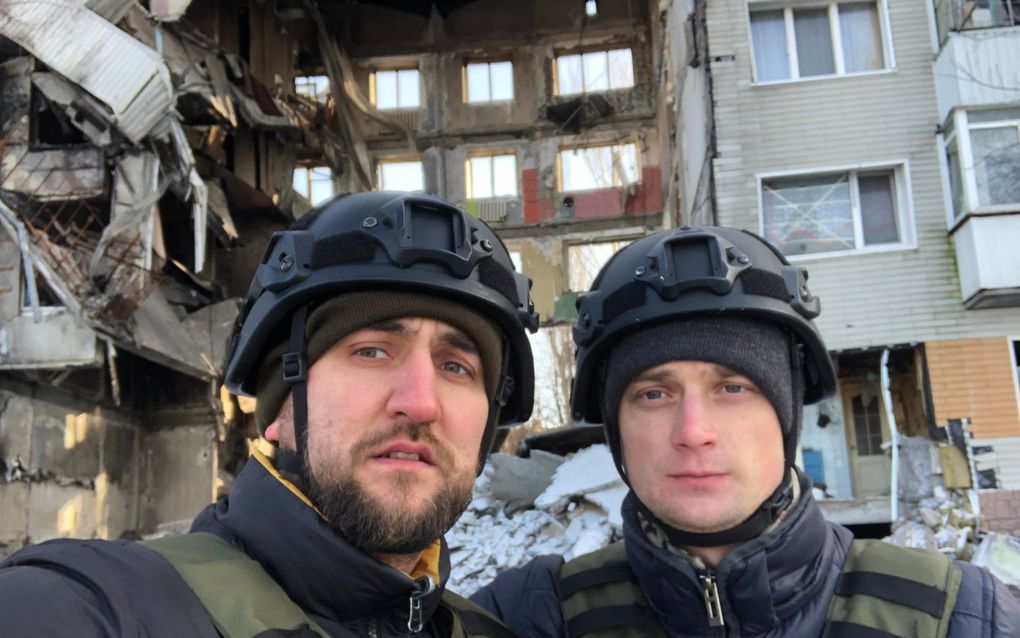
Chaplains Viktor Morozuk (l.) and Igor Rozvodovsky. Photo RD
Eastern Europe
Army chaplains in Ukraine bake pizzas for numb, traumatised soldiers. A warm, human gesture amid the horrors at the front. "The doctor shouted to me, "Chaplain, pray harder!" Moments later, the patient got his heartbeat back."
The battle is fierce in Maryinka. The town in eastern Ukraine's Donetsk oblast is under heavy fire from Russian shelling. Dozens, sometimes hundreds, of shells hit it every day. Before the war, Maryinka had just under 10,000 inhabitants. Now, only a desolate, devastated and almost extinct area remains. Ukrainian and Russian soldiers fight each other to the death here.
White snowflakes fall on the blackened ruins. Winter is taking its toll in Ukraine. Cold, snow and rain plague the frontline. The temperature regularly drops well below freezing. Soldiers get chilled in the muddy, half-frozen trenches.
"The situation at the front is very tough," says pastor Viktor Morozuk (34), a Baptist from Zhytomyr. "When there is rain during the day, and it freezes at night, the uniforms of the soldiers become as hard as cardboard. They suffer frostbite on fingers and toes."
Weapons
About every month, Viktor Morozuk (married, father of three young children) and Igor Rozvodovsky (married, father of two children) spend a week among the soldiers at Maryinka. A monstrous drive of roughly 2,500 kilometres on battered roads because tanks also use them. The two chaplains worked last year at Bakhmut, the hard-hit town in eastern Ukraine.
The army pastors provide pastoral care to soldiers and the wives and children of fallen soldiers. Their workplace is a "stabilisation post", where initial medical care takes place, barely three kilometres from the front. "We give every soldier who is brought in a hug," he says. The army pastor's "weapons" are simple. Listening. Praying. Pouring tea.
"And we bake pizzas," says Morozuk, dressed in an army-green shirt. "We bring frozen pizzas and a small oven from Zhytomyr. After heating them, we hand them out to soldiers in the cold. There are plenty of soldiers crying with emotion as they eat their pizzas."
Biscuits and gifts from the home front, the church and the school in Zhytomyr also found their way to the front. "Before our departure, an elderly man came and brought a jar of honey to take with us. He said: you have to do everything you can so that the spirit of our soldiers remains strong. And so that they feel we have not forgotten them." The pastors also bring along sleeping bags. "Soldiers at the front regularly have to leave their equipment behind while fleeing bombing raids."
Ambulance
Morozuk hears the worst stories in Maryinka as he helps to bring wounded and killed soldiers from the evacuation ambulance to the medical post. As the pastor makes tea behind the ambulance, two men share their experiences. One soldier with badly damaged legs and one arm; the other arm is broken. The other soldier with his head in bandages, while he can still see with one eye.
"Private Sergey told his comrade: 'I saw you flying through the air by the pressure wave of a shell impact and come down behind us.' I thought, 'That one is no longer there, he's done.' I looked back and saw you lifting your head. I was so happy. You were still alive." The other responded, "I also thought you had been killed. I saw you lying with one leg in the wrong direction but noticed you were still alive." The two burst into sobs. Emotion overwhelmed them. "That's when I got upset, too," says the pastor.
One day, Morozuk helps a soldier take off his boots. "His toes were black. That boy was really struggling." The army pastor fulfilled his pastoral duty. "We prayed together. I tried to show him another side: the fact that he was still alive, that he had not been killed in battle. He was also grateful for that in spite of everything."
Plague of mice
The Russians sow death and destruction in Maryinka on a daily basis. Heavy attacks sometimes follow each other in rapid succession. "Our boys are holding out. One soldier fell from the pressure wave of a shell hit, broke three ribs, but kept firing at the enemy until he could be taken away to an emergency hospital."
The hardest part for the troops, according to the chaplain, is having to be constantly alert to the deadly threat from the Russians. Military Mikhdal struggles with chronic pain in his eyes from constantly peering into the thermal imaging cameras. "Russian soldiers use special heat-absorbing uniforms, making them virtually invisible at night. They sneak into Ukrainian positions to carry out a massacre."
In the trenches, infectious diseases take their toll. Rats and mice crawl through army tents and into sleeping bags. Looking for food. "A plague of mice," says Morozuk. "Anything that is not in sealed containers, they eat." Military personnel, therefore, regularly take cats to the front line.
Threat
Rats feast on carelessly abandoned fallen Russian soldiers. Photos of a Ukrainian soldier with a rat the size of an AK-47 rifle are circulating on social media. "I have not seen them that big yet," says Morozuk. The rats and mice pose a threat to the troops. But combat equipment is also at risk from the risk of gnawing through pipes.
Many Ukrainian soldiers are severely traumatised by the horrors of war, Morozuk says. "The psychological distress is very high. Some have a strong spirit and want to fight for our country despite the harsh conditions. Others don't see it anymore and want to go home. Or no longer want to live."
The men come back from the front differently than they go there, in his experience. "Many soldiers see large numbers of comrades killed. That is very tough. Moreover, the army fails to recapture territory. That greatly affects their state of mind."
Coarser
The lifestyles of soldiers, often recruited civilians, change dramatically as a result of sometimes being constantly under bombardment. "For example, people become coarser because of the things they experience," he says.
The miilitary pastor also recognises changes in himself, sometimes in small things. "When I was in the Netherlands last summer, I was startled by a helicopter flying overhead. In Ukraine, there is nothing but death coming from the sky."
Morale varies widely among the troops. "It depends on many factors. For example, how a group commander is. Whether he encourages and motivates them."
Enemy
The stalled counteroffensive, which Ukraine launched in June last year, is affecting the morale. "I am not a military analyst, but I see that the situation is not easy. The army cannot push forward. We remain where we are. Ukraine needs the strength of God to overcome the enemy. I believe He can give us that strength."
The Ukrainian army is facing severe shortages of troops and ammunition. "Weapons, aircraft, support equipment," Morozuk lists. The need is dire. "Without weapons, you cannot fight."
The war situation is worsening in Ukraine, indicates the pastor. "And not so little, too. Many people are dying or dropping out injured." To alternate the troops on the front, the army chief wants to recruit 500,000 civilians.
"Many people are anxious to go to the front because of the stories they hear." Corruption in the government and military does not make the situation any easier. Aid does not always reach the right place but sometimes appears to have suddenly 'disappeared'.
Body bags
The chaplains, shoulder to shoulder with doctors and nurses, roll up their sleeves in the first-aid station. "Many boys feel very defeated. Our main goal is to give them hope and turn their eyes to God. We try to motivate them and encourage them. Physically, psychologically and spiritually. I notice that this gives them strength again. They know again what they are working for and can move forward."
Pastors also take in relatives of fallen soldiers. Heavy work. "During our last visit, we had to take photos of fallen soldiers in body bags for relatives," he says. Despite the tough conditions at the front, the chaplain keeps faith. "I still believe in victory. God is with us."
Every journey towards Maryinka is a sacrifice. "First and foremost, for our family who remain behind. There is a risk that we, too, will be killed. And the church has to relinquish us every time." Before each new trip, Morozuk calls people to come along. "For some, however, it is too heavy, too emotional," he says.
Sacrifice
The deployment in eastern Ukraine also requires a sacrifice from chaplains. Morozuk makes a dismissive gesture. "We are just doing what is necessary. It is a desire laid in our hearts. We do the work from our hearts and to God's glory."
How do the pastors keep going? "We have to prepare well before every trip. Everything you experience on the frontline cannot be erased from your memory. However, the most important thing is that God gives us strength to endure. If He weren't there, we wouldn't be having this conversation."
Heatbeat
One day at the medical aid post, Morozuk never forgets. Soldiers bring a badly wounded tank soldier into the medical post in Maryinka. The man is burnt but still has a heartbeat. Doctors begin to operate on him.
"Suddenly, he had no heartbeat," says the military pastor who held the patient's feet during the operation. "The two doctors and nurses started resuscitating him; I saw them fighting for his life." Morozuk stood by the operating table, praying aloud for God to spare the tank soldier's life. "The doctor shouted to me, "Chaplain, pray harder!" Moments later, the patient got his heartbeat back."
For the chaplain, it is undeniable. "God is very close. Where death is close, He is also very close. A person who lives on in vanity does not need God. But in the most difficult circumstances of life, people sometimes run to Him. For everyone, it is important to be near God's presence."
This article was translated by CNE.news and published by the Dutch daily Reformatorisch Dagblad on January 20, 2024
Related Articles


